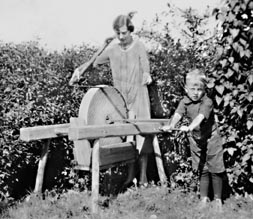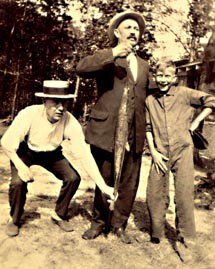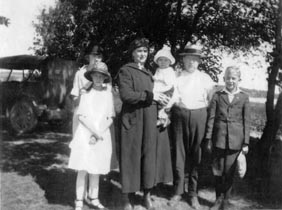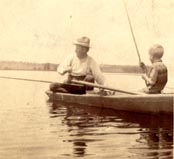|
|
|
|
|
I would like to tell you about some of the interesting characteristics of the apartment building. While we did have mechanical refrigerators, they were not individually operated. Rather, there was huge common compressor located in the basement room of the apartment building. This room was kept under lock and key, and only my father had the key. Every Monday night was “defrosting” night. This meant that my father would go to the basement and turn off the compressor and all twenty-two of the refrigerators would defrost until Tuesday morning, whether the tenants liked it or not. Another thing. At 10:30 every night, twelve months out of the year, my father would “bank” the furnace until 6:00 A.M. the next day. This meant no heat from 10:30 at night until the next morning. Those were hard-and-fast rules that my father abided by, the only exception being that if my mother was having a late party then my father would keep the heat on an hour or two longer.
To give you an idea of how conditions were at this time, in this building of twenty-two apartments (therefore twenty-two different families), we — the Johnsons — along with two other families (the Ardeesers, and the Wittenbergs), were the only families to have automobiles. Parking was not a problem. Today Paulina Street is a one-way street and it is virtually impossible to find a parking spot on the street after 5:00 p.m. As kids, we used to play baseball on the streets and never, if ever, were we interrupted by cars coming down Paulina Street. In the apartment building down the street very few of the apartments had their own telephones. A community phone was located in the hallway of each tier of apartments. That particular building even had some bathrooms that two apartments would have to share.
Because of the depression and the lack of money in the Johnson family, my folks would rent out our summer home at “the lake” for the entire month of August. This way we garnered enough money to pay the taxes and other incidental expenses that would allow us to keep our summer home. During these Augusts when our house at “the lake” was rented, my mother and I were always invited to spend all or part of it at my Uncle Charles Dahlstrom’s house on McCullom Lake in McHenry, Illinois. McCullom Lake was not a Lake Geneva, but it was better than nothing — or was it!
McCullom Lake
My uncle Charles Dahlstrom was the owner of a hardware store in Chicago. Those were the days when merchandise was shipped to him in sturdy wooden boxes. He used boards from these boxes for the siding in his “homemade” summer home at McCullom Lake, covering this siding with corrugated sheets of tin. This was living in a very primitive way. There was no electricity, there was no running water, and we got our drinking water from a well in a cellar where the spring water ran constantly. We would go down into this cellar and fill a porcelain-lined bowl with drinking water. Then, when we drank, we — all of us — would use the same tin soldered dipper to dip the water out of the bowl. If we didn't drink all of the water in the dipper we'd dump the unused water back in the porcelain-lined bowl.
A six-holer outhouse was located about 100 yards from the house — three holes for the women and three holes for the men. The two sets of three were separated by a wooden partition.
McCullom Lake was truly a mud-bottom lake. We would take a boat and row out past all of the weeds and try to find a clean spot to swim. We'd step out of the boat and into “the lake” and sink up past our ankles into the mud. It was better than nothing — or was it!!!!
An Early Career
When I turned fifteen years of age I got a job as a weekend stock boy at a local F.W. Woolworth dime store, seeing to it that all of the counters were always filled with the five-and ten-cent “goodies.” Here I earned Woolworth’s New York wages of 29.63 cents an hour (less than 30 cents). Both at home, and at “the lake,” money for me was extremely in short supply.
Dating, Or Not
There was no such thing as dating or taking a girl out for any dinners or such things. This was true of the whole crowd who were my friends. We traveled in gangs (this term did not have the bad connotation that it has these days). At “the lake,” for example, ten or fifteen of the kids my age would spend most of the day time swimming or playing games in the park. In the evenings we would walk as a gang, into town — maybe have a coke — and then, as we would go home, we would wade in “the lake,” wandering up and down the various municipal piers, examining all of the boats. Every Tuesday night there were free movies at the municipal park and we would attend these. Boys and girls would go together (never dates), although to quote a line I learned at a later time, perhaps some of the guys and gals would “make eyebrows” at each other.
I have such fond memories of the members of that gang and I have kept in touch with many of them until they were called to heaven. Those that have departed from this world are Warren McNiel, Alfred, Bud, Watson Evelyn Watson Brundage, Muriel Watson Dooley, Nessie Geiger, Hector Hill, Elmer Billings; those are the few I remember. Those of the gang still around as of this writing are Bennie Ward, Norm Fehrm, Ginny Fehrm Meyers, Betty Sullivan, of course Al Canfield, the Darre brothers, (Bob and Al), and one of my favorites, a “wannabe” member of the Lupus and that is Warren “Prunes” Rassumussen.
The same “non-dating” situation existed in the neighborhood in Chicago. Here I belonged to similar gang, where perhaps there was the same “eyebrow making” going on. I've lost track of most of this gang, but names that come to mind are Paul Anderson, Dickie Johnson, Johnnie Gannon, Robert Louis Stevenson, Herman Kellman, Harold Pierce, Bernice Behnan, Julie Eichenberger and her brother Herman, Jane and Marion Back, and Bernard “Fats” Behnan. Johnnie Gannon and I played the Bugle and Herman Kellman and Robert Stevenson played the drums; Harold Pierce would be the drum major and Paul Anderson would carry the American flag. We had our own drum and Bugle Corps. On given Saturdays we would march down Clark Street, and up and down Devon avenue and go into all of the local taverns and play for the patrons in these taverns. Fats Behnan and Herman Eichenberger would “pass the hat” and it was amazing how much money we would collect. Anyhow, that’s how I would pass my time with my gangs — never got in trouble — just had fun without spending money.
Post High School
After graduating from Senn High School, I was talked into attending the University of Illinois, and majored in Dairy Technology. I was not, and still am not a good student, so I left the U of I after two years. (The University and I agreed that it was a waste of time and money for me to spend any more time or money there.)
I might add here that the year is now 1940 and the country and the rest of the world is just beginning to pull out of the depression, but money and jobs are still scarce. I went job hunting and found a job as an office boy at The Continental Coffee Co. Mr. Cohn, Mr. Goldstein, Mr. Silverstein (not Swedish Lutherans) told me that if I stuck with them at The Continental Coffee Co., I'd have a good future as a salesman for The Continental Coffee Co. up in Minneapolis, Minnesota, where all the good Swedish Lutherans were. I was making $18.00 a week. After a year I left The Continental Coffee Co., for a job at The Asbestos, Asphalt, and Insulation Manufacturing Co., Here I made $20.00 a week running a multilith printing press.
End Section Two: Go on to Next Section
|
|









